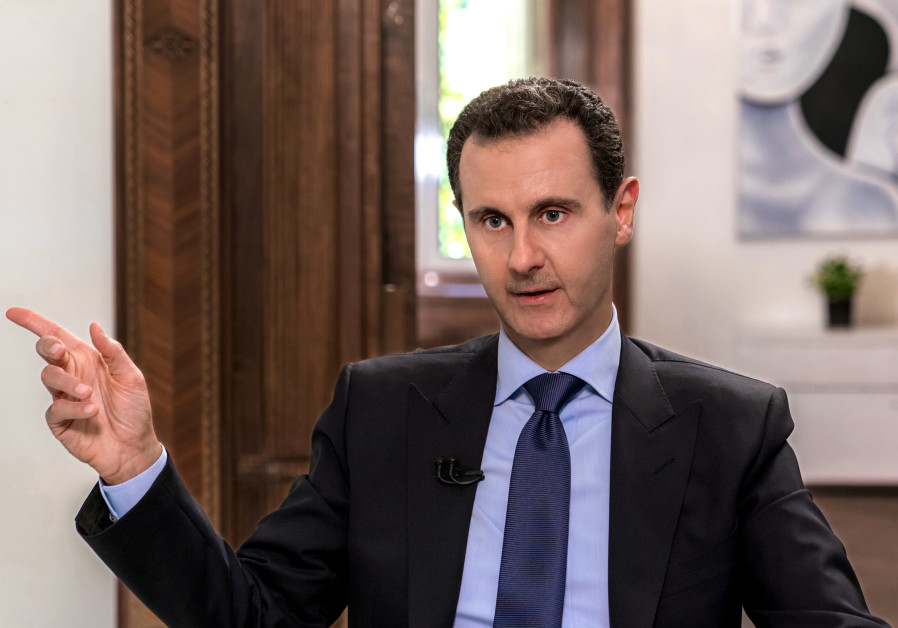Syria vows to recover Golan Heights in light of Trump’s words

Syrian President Bashar Assad speaks during an interview with Russian television channel NTV, in Damascus, Syria in this handout released on June 24, 2018. . (photo credit: SANA/REUTERS)
BEIRUT – The Syrian government vowed to take back the Israeli-occupied Golan Heights as its allies and enemies alike condemned US President Donald Trump on Friday for moving to recognize Israeli sovereignty over the territory seized in war.
Trump’s statement on Thursday marked a dramatic shift in US policy over the status of a disputed area that Israel captured from Syria in the 1967 Middle East conflict and annexed in 1981 – a move not recognized internationally.
Against this backdrop of hostility towards the US move, Secretary of State Mike Pompeo visited Beirut where he took aim at Israel’s main regional foes – Hezbollah and its backer Iran – and declared the success of US sanctions against them.
Trump’s declaration is the latest US step to fuel anger in the region, both in states that are hostile to Israel and others that have relations with it and are allied to the United States.
It follows the US recognition in December 2017 of Jerusalem as Israel’s capital – a decision that also stirred international criticism as the city’s disputed status remains at the heart of the Israeli-Palestinian conflict.
Russia, an ally of President Bashar al-Assad with forces in Syria, said Trump’s comments risked seriously destabilizing the region, and it voiced hope the statement was just declaratory.
Iran, Assad’s main regional ally and which also has forces in Syria, condemned the statement as illegal and unacceptable.
“The personal decisions of Trump…will lead to crisis in the region,” Iran’s foreign ministry spokesman said.
Turkey, a US ally and an adversary of Damascus, also said the move had brought the Middle East to the edge of a new crisis and the legitimization of the occupation of the Golan Heights could not be allowed.
Israeli Prime Minister Benjamin Netanyahu thanked Trump for his gesture “at a time when Iran seeks to use Syria as a platform to destroy Israel.” It could help Netanyahu in the midst of a tough re-election battle, analysts said.
The Syrian government said the Golan was an “indivisible” part of Syrian territory and recovering it “via all means guaranteed by international law is still a priority.”
It said United States with its “stupidity and arrogance” had no right to decide the fate of the area and any move to recognize Israeli sovereignty over it was “an illegal action with no impact.”
After remaining calm for decades since a 1974 armistice monitored by U.N. peacekeepers, Golan re-emerged as a flashpoint for regional tensions during the Syrian war. Last May, Israel accused Iran’s Revolutionary Guards of launching a rocket salvo into its territory from the Syrian side of the truce line.
Israel, which has mounted numerous air strikes against what it has called Iran-backed targets in Syria, has demanded Russia keep forces allied to Tehran away from the boundary.
The Syrian side was held by rebel forces for years until pro-government forces recovered it in July.
US OFFICIAL: ISRAEL “COULD NOT GIVE UP THE GOLAN”
Jason Greenblatt, a senior White House adviser, said on Twitter that “under any conceivable circumstance, Israel could not give up the Golan … To do so would endanger Israel’s very existence.”
But Fouad Mundhir, a Syrian whose home village is in Israeli-occupied Golan, said Trump was “canceling the will of an entire nation.
“You say you are carrying the flag of democracy. Okay, Mr. Trump, have you taken into account the will of the people of the Golan?” he told Reuters in Jaramana, near Damascus.
In the Golan itself, Druze Arabs also rejected the move, while Israeli settlers welcomed it.
The European Union said its position on the status of the Golan Heights was unchanged and that it did not recognize Israeli sovereignty over the strategic plateau.
Germany said any change in borders should be “done through peaceful means between all those involved,” while France said it did not recognize the Israeli annexation of the Golan and any recognition was contrary to international law.
The Arab League, which suspended Syria in 2011 after the start of its civil war, said Trump had paved “the way for official American recognition” of Israeli sovereignty over the Golan and called this “completely beyond international law.”
Egypt, which made peace with Israel in 1979, said it still considers the Golan as occupied Syrian territory.
Israel says Syria’s civil war has reaffirmed the need to keep the plateau – coveted for its water resources and fertile soil – as a buffer zone between Israeli towns and the instability of its neighbor.
In Lebanon, Pompeo said the United States would continue to use “all peaceful means” to choke off funding that “feeds Iran and Hezbollah terror operations.”
“Lebanon faces a choice: bravely move forward as an independent and proud nation, or allow the dark ambitions of Iran and Hezbollah to dictate your future,” he said.
Hezbollah-aligned Lebanese leaders including President Michel Aoun told him the group was a Lebanese party with popular support. The group has three cabinet ministers and together with its allies controls more than 70 of parliament’s 128 seats.
The United States is a major donor to the Lebanese army but its allies, including the Sunni Muslim Prime Minister Saad al-Hariri, have been weakened as Iran’s role has deepened through Lebanon, Iraq and Syria and Saudi influence has receded.
Washington has reintroduced sanctions on Iran and imposed new financial sanctions on Hezbollah which Lebanon’s Hezbollah-aligned president, Michel Aoun, said on Thursday were hurting all Lebanese.
Join Jerusalem Post Premium Plus now for just $5 and upgrade your experience with an ads-free website and exclusive content. Click here>>






Comments are closed.